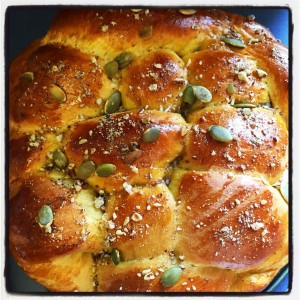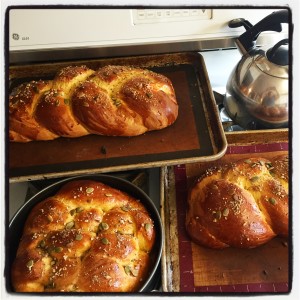Welcome to His Brother’s Keeper, a fictional mystery series set in 2000, in New York. I’ve decided to periodically lend my blog to a friend, Eva Hirschel. Eva doesn’t have a social media presence but she does have a mystery that she wanted to publish serially on-line, so I’m giving her a hand. (If you’re just tuning in now, I suggest that you start at the beginning). Here is Part I, Chapter 15. Enjoy!
Chapter Fifteen
 In the end, Simon agreed to come home from work earlier than originally planned. Ronit had a class and none of the high school babysitters I occasionally used were available on a school night. My grandmother was not due back in New York until Passover. It was one of those times when I wished my parents were around, instead of traipsing around the globe having the time of their life. I felt bad asking Simon to leave work at the ridiculously early hour of five and make it home by six, but he was their parent too.
In the end, Simon agreed to come home from work earlier than originally planned. Ronit had a class and none of the high school babysitters I occasionally used were available on a school night. My grandmother was not due back in New York until Passover. It was one of those times when I wished my parents were around, instead of traipsing around the globe having the time of their life. I felt bad asking Simon to leave work at the ridiculously early hour of five and make it home by six, but he was their parent too.
Brooklyn Heights was an elegant, landmarked community of meticulously renovated brownstones and ridiculously over-priced coop apartments with river views. When traversing one of the tree-lined sidewalks in the heart of Brooklyn Heights and admiring the nineteenth century architecture, it was hard to think that just a few blocks away was Court Street, the commercial strip that divided Brooklyn Heights from its neighboring downtown community of office buildings, discount stores, and low-income housing. The area was also home to Family Court, the State Supreme Court, and Federal Court, hence the name Court Street, as well as Borough Hall and New York City’s Board of Education. The fact that there were so many people who came to the area to work every day was the only justification I could come up with for the ongoing existence of the Achim Brothers Diary Luncheonette, a sad little kosher dive that stank of cooked onions, stale coffee, and commercial disinfectant.
I looked around the restaurant, not that there was much to see. It was a tiny luncheonette, with a counter at the front and a handful of tables in the back. I figured that they must do most of their business by delivery. The walls were unadorned, except for two cheaply framed photographs of the late Lubavitcher rebbe, and an El Al poster of Jerusalem taped up between them. Next to the counter was a small sink so that observant customers could wash their hands before eating. Above the sink were taped copies of the blessings, in Hebrew and English, to be said before and after eating. At one of the tables closest to the counter were three young kippot-clad men talking loudly and laughing. In the back corner sat a small but plump man with a long gray beard.
“Mrs. Marcus?” he called, waving.
I walked over to his table. “Call me Abby,” I replied, putting out my hand to shake his but pulling back quickly as I remembered that being observant, he would not touch someone of the opposite sex who was not related to him.
“Sit, sit,” he said, motioning with his arm. He didn’t get up, but if he had, I didn’t think he would be any taller than I. The little bit of hair left on his head was covered with a dark kippah. Behind his black-framed glasses, his deep-set eyes gleamed warmly as he smiled at me. “Such a pleasure. Sit, nu, sit.”
I took off my jacket and sat down across from him.
“A glassel tea, maybe I can order for you?” Mr. Shapira asked me.
“No thank you,” I answered.
“It will be good, take the chill off this evening,” he said, and nodded to the woman behind the counter. “Two teas please here. Thank you.”
What could I do? Apparently for the duration of this job I was condemned to drink tea. It killed me to think that down the block there was a Starbucks, where other people were enjoying cups of strong, dark coffee.
“Let us begin, yes?” he asked me, and I nodded. He settled himself in his seat and continued to speak as the woman brought over two glasses of tea. “Thank you. Drink. L’chaim. Now, I am a simple man, and I have lived a simple life. I am a scribe, and thanks God, I manage to have food to eat and a bed to sleep in and a roof over my head. Every day I take another breath, I say thanks God for keeping me alive, though I don’t know why God chose me for this honor, for helping me to see another morning and another evening. Every day I say thanks God for bringing me out of the hell-holes where I spent three years of my life. I lost my parents, my wife, my brother, may their memories be for a blessing, but thanks God my sister lived and we have each other. Every day I say thank you for what I have and don’t spend a lot of time on what I don’t have, because what can you do? That kind of thinking gets you nowhere except mad and ungrateful. With God’s help I lived through a terrible time and managed to see another sunrise. Why me and not my brother, not my father or mother, I don’t know. But still I must give thanks to God. You understand?”
I wasn’t sure I did, but nodded anyway.
He took a deep gulp of the hot tea. “So when Mrs. Freiburg called and asked me to speak to you, of course I agreed. How else to respond to a friend? A link to the world that used to be? We are landsmen, I went to cheder with her brother, zikaron livracha. Sometimes I am a guest in her house for Shabbos, especially since my wife, my second wife, zikrona livracha, passed away. You understand?”
What I was beginning to understand, rightly or wrongly, and despite the friendliness evident in his eyes, was that he didn’t particularly want to speak to me, but was doing so at the behest of Mrs. Freiburg. However, it didn’t seem like malevolence on his part, simply an unwillingness to get involved in something difficult or complicated.
“Over the years, we help each other. She and her family needs a claf, a scroll for a mezuzah, they come to me. Ketubot, marriage contracts, they come to me. My father was a scribe, my grandfather was a scribe, and so on. They know if they need something written, they come to me and it will be beautiful, kosher, just right. If I need help, I go to them. My sister had some troubles, I didn’t know what to do, I go to my friend, her son recommends a doctor. So, we will speak, you and I. But what I must tell you more important than all, what my old friend wanted to tell you, and couldn’t, is this–be careful. Mrs. Freiburg, she doesn’t think you have been asked to do this research as a nice birthday present for an old man. She thinks maybe there is some other reason. Something to do with her grandson, Arieh. You see, Arieh, he is not a bad boy. Maybe he overdoes it sometimes, but he is a good boy. But he belongs to a group of young men, all good boys but too quick to jump, too safe to think careful. They are real Americans, these boys, and they don’t think about being careful. They just think about being right.”
“And what are they trying to be right about?” I asked, trying not to show my impatience as Mr. Shapira stopped to take a breath and gulp some more tea.
“Yes, yes. They want to control the future by controlling the past. The past is like their coloring book. They think that if they can reach back into the past, if they can get what they believe is theirs, then they can get what they want in the future.”
“But what do they want?” None of this was making sense, and I wanted him to get to the point.
“Ah, that is the question. What they want is the future, I believe, the power to shape the future. None of them will ever lead their community, none of them will ever be the rebbe, but they want to be close to the rebbe. They want to help make decisions. They want a big and bright future. They are, none of them, scholars. Smart, but not brilliant. Rather, they are politicians, wheelers and dealers. They are good boys, but also angry young men who never had to prove themselves and test their courage. They have been raised on the best of what America has to offer them. They have never known hunger, never known cold, never known pain. And this makes them feel bad. Like they are not worthy because they haven’t suffered. It also makes them feel angry, that they can’t fight against the evil that their parents and grandparents knew. Because they believe that even though life has been good to them so far, that history in the end is against them, and the world is against them, and therefore it is their right to grab what they believe is theirs. Things may be good now, but there is no guarantee that things will be good tomorrow, unless they make sure it will be so by their acts of bravery and heroism. They are looking for a cause, something to fight for.”
He stopped speaking and looked at me, waiting for me to react, but I was having trouble following him. “Where do I come into this?” I asked. “What does this have to do with the Gelbermans?”
“Yes, yes. That is the question,” he replied. “What do you think? You must know about these things in your line of work. What do you think this might have to do with?”
One thing I learned long ago was that when it came to trusting people, you had to go with your gut. There wasn’t usually time to gather quantitative analysis on someone’s trustworthiness. My intuition was telling me that while Mr. Shapira might have been hesitant to talk, not wanting to dredge up difficult memories with a total stranger, he was a friend, not a foe. I didn’t think I had anything to lose by being honest with him. “I admit to feeling somewhat out of my depth here, Mr. Shapira. The only thing I can think of that could be motivating someone to get involved with this whole thing is the money that Yosef Yehudah is supposed to have been given by his Chasidim to get his grandson out of Poland. Now granted, there’s a lot I don’t understand about the family, about the Holocaust, and about the Halizchers in general. But honestly, it’s hard for me to imagine that the money is simply sitting somewhere waiting to be re-claimed. If in fact the whole family died, it had to have either disappeared or been used during the war.” Of course, what I didn’t say was that if someone had lived, someone like the other grandson Yankeleh, then maybe in fact the money was still in Gelberman hands. And then it hit me — that had to be why people were looking for Jack Gelberman. That had to be why Sarah Gelberman’s story did not check out. Maybe she truly was not who she said she was, and she had hired me to find him so that someone, herself or some other person yet unknown, could try to reclaim the money from Jack Gelberman. And if that was the case, whomever she was, either she or Jack Gelberman, or both, could be in a lot of danger. Trying to stay calm, I took a deep breath and spoke. “Is that what Arieh is after, this theoretical stash of money that might have belonged to his ancestors?”
Mr. Shapira unexpectedly smiled. “You are sharp, I see. But I think you are wrong. Maybe not entirely wrong, because if there are other people who think that there is a Gelberman alive, they may only know about the money and may want to find it. But I would be surprised if that is the case. You are right in assuming that the money would be long gone. I don’t know myself, but I would also think it would be long gone. No, no, what Arieh Freiburg and his friends are after is not the money. It is something else, something entirely more valuable. So you see, my friend Mrs. Freiburg is not worried about Arieh harming you, but she is worried he may not be the only one. She wants you to be careful.”
“But about what? From whom? What is it that they are looking for? Can you tell me more?” I asked, hoping that he might give me some information to relieve the anxiety I was now experiencing over the fates of Jack and Sarah Gelberman.
He looked past me, his eyes staring straight ahead. He sighed deeply and pulled on his beard. “As I said, I am a scribe, a simple man. What do I know from these things? There are rumors, crazy stories. We Chasidim love stories. There was a once a rumor that I heard as a young boy about a special piece of parchment that was in the possession of our rebbe, Yosef Yehudah, the Halizcher rebbe. It was said that this document was given to him by his father, the rebbe before him, Leib Mendel, who was given the parchment by his teacher, who got it from his teacher, who got it from his teacher. It is said to be a precious piece of parchment. But that is all I know. Rumors.”
“That’s it?” I asked, unwilling to believe this was the whole story. This couldn’t be all there was.
“Mmm,” he nodded, still looking at me. “The problem is that no one really knows what this piece of parchment is, and so everyone thinks he knows. That is worse than knowing itself, to think you know, because then you have to try to prove what you know. And some people have themselves convinced that this little scrap of parchment contains something very important, and if they think you have it or can find it, their goal is to get this back from you. I am a scribe and so one thing I do know is the importance of authenticity. If a scrap of parchment is real, the owner has credibility, he has power. And it doesn’t even have to be real if he can convince others that it is. So it is dangerous, and you would do best to drop this. I want you to know there is no way either Gelberman boy lived. You are chasing ghosts.”
I had to ask the question that was stuck in my throat. “Why is everyone so sure that neither Yankeleh nor Leib could have lived?” Mr. Shapira looked at me, and nodded his head. He took his time answering, getting up to stretch, adjusting his glasses and twirling the ends of his beard. Finally he took a deep breath and sat down again. “Now I will tell you a story. There is much in this world that I do not know. But of one thing I am certain – there is no chance that either Gelberman boy survived. In 1941 all of the Jews from Halizch were rounded up and deported to the ghetto. What it was like, you cannot imagine. The crowding, the hunger, the filth. But somehow we managed to crowd in, somehow room was made for another group of people, and another, and still another. We lived there, crowded in among the earlier arrivals, and it was terrible, but not as terrible as what was still to come. The rebbe continued to hold court, his Chasidim came to him and they studied and prayed, like always, but not like always. We had a cheder, we had a beis meidrash, we had a soup kitchen. Life was difficult, but we kept on the best we could, even as conditions got worse and worse. After some time, the rebbetzin died of typhus, and so did her daughter Sura. We didn’t understand why the rebbe hadn’t agreed to save the grandson when he could have, why he hadn’t agreed to save himself when he could have, but he was our rebbe, you see. Who were we to doubt? He believed, until the very end, that the Jews would not be destroyed, that the Nazis would be defeated. He didn’t seem to care about whether or not he lived to see it, that wasn’t important. He said he couldn’t worry about his own fate when the fate of his Chasidim was hanging in the balance. Who was he to place more importance on himself, to save himself when his people were suffering. What was important was not to give up faith, not to stop believing and praying and studying and giving thanks. A true tzaddik he was. Until the day he died he was there to give us hope, to give us comfort. Even in the camp, in that place of hopelessness and despair, he led prayers, he taught, he looked us in the eye with those deep blue pools of his and didn’t let us give up. And in the end, though he was no longer there to see it, he was right. The Jews were not destroyed and the Nazis were defeated. Life kept on going.
“Thanks God, he died before the boys. He was so weak and thin, so sick by that time, all you could see was his beard and his big blue eyes like deep, shining pools. It was a miracle he made it to Treblinka at all. The men his age, they usually didn’t even waste their time with, usually they were killed right away. But through some miracle, he was placed in the line going to the right, only a few people ahead of me, with all the young men. And Nossen, his son-in-law, Nossen who was already skinny and not strong, Nossen was sent to the left. Again, why, I don’t know. We never saw Nossen again. We knew what happened to those who were sent to the left. The rebbe didn’t live a long time in the camp, but while he was there, even so sick, he continued to teach, to pray, to comfort, to keep us from becoming animals like the Nazis wanted. He helped us remember our humanity, who we were. Even so shrunken and so sick, the light of Torah still shone from his eyes. We did our best to help him and protect him, but one morning that was it. He collapsed and was shot right there, like a rabid dog. Ay, why am I blessed with such a memory, to live with that picture in my head always, I don’t know. But he managed to die with dignity, a look of peace on his face, God’s name on his lips.
“One day not too long after that, they rounded us up and sent us to work. It was March 28, 1942. I know that because it was two days before Pesach. Our work detail that day—to cover bodies in a ditch. I do not want to give you nightmares, Mrs. Marcus, I have plenty to share but why should you have that burden, so I will spare you details. And don’t tell me you want to know, because you don’t. We hear shots, many shots. Then they open the door of the truck and tell us to get out and start working. In front of us is a ditch. In the ditch are bodies, hundreds of bodies. Many are people we know. You see, the Nazis are not stupid in their cruelty. They know just how to make us suffer as much as possible. These bodies, they are those who came with us from Warsaw, and some even from Halizch. They are our neighbors, our friends, our family. And there in the ditch I see the two boys, Leib and Yankeleh. There they are, holding hands still, Leib under Yankeleh. Always, he was the younger, but the stronger, the leader, always supporting his brother, even in death.” He turned from the window to face me. “So you see, Mrs. Marcus, there is no way this Jack Gelberman you are chasing is Yankeleh the rebbe’s grandson. I took a good look at the boy, I saw those sad dark eyes of his staring at nothing, and believe me, I can assure you he was not alive.”
“You’re absolutely sure?” I asked quietly.
“Yes, absolutely. He could not have lived after what they did to him. I managed to reach over and close his eyes while the guard wasn’t looking, and he was cold to the touch already.”
“And then what did you do, if you don’t mind me asking?”
“With heavy hearts, we began to cover them with dirt. It was a terrible job, but it was also a mitzvah, the most we could do to properly care for the dead. Silently, to ourselves, many of us said Kaddish. A guard came out of the truck and spoke to the one guarding over us as we worked. I couldn’t hear him, but he must have told him to make us hurry, because he tried to get us to work faster. But it was bitter cold, and starting to snow, and we were so weak and sick ourselves that we couldn’t work faster. Finally, when we had covered them with just a thin layer of dirt, they rushed us back into the truck and took us back. Then a strange thing happened. I never slept well all the time I was there, but at that moment I must have dozed off, and I had a strange dream. I dreamt that I was looking behind me as we drove away in the lorry, and I saw the rebbe’s hands reached down from heaven and lift Yankeleh out of the pit. But then Yankeleh turned in to Leib, like they melded into one whole, I could see his bright blue eyes like the color of the sky, and he was being lifted by the rebbe, and the rebbe before him, and the rebbe before him, and so on back to Adam. By the merits of the forefathers the boy was lifted out of the pit and floated along the ground, and into the forest. It was a beautiful dream, because I woke up again to the nightmare that was life, but I had in my heart the knowledge that both boys had been carried safely to the next world where they would know no pain and no horror like what they had already seen in their young lives. It was a message, a message of hope from the rebbe that he was able to send to me even from the grave. That dream gave me hope, even on the darkest days, and helped me to not fear my own death. I knew how much the rebbe cared about his chasidim, and I knew that just as he chose not to value his grandsons’ lives above the lives of his chasidism, he would surely do no less for me in death than he would do for his grandsons.”
One part of me was full of skepticism, doubting Mr. Shapira and trying to come up with logical explanations for what he reported to have seen. But I had to admit that a small part of me that felt like I was there with him on that horrible, cold day, seeing the vision in his dream and drawing some small measure of comfort from it. In the end, the researcher in me won out. “Did you tell anyone about this dream?” I asked tentatively.
“That was also a wonderful thing, you see,” he answered. “I was not the only one to have this dream. Many of us who were there that day had such a dream. The details were different from man to man, but the dreams were similar. Even some who were not Chasidim, even them the rebbe reached with his rachmanes, his compassion, you see? Many people had that dream, and the story of the dream spread, giving comfort to countless.”
I nodded encouragingly. “That’s amazing.”
“Yes, yes, it was. It truly was. A miracle. As I said, I will never understand why God chose me to survive, and not someone else. But I know that that dream helped me. It gave me strength in the darkness. That was what the rebbe did, and that’s what Leib himself would have done if he had lived. There are just people like that, people who have an extra spark in their soul. And you are so lucky when they share some of the light of that spark with you. Even after death, they are able to spread some of that light.”
By now my mind was racing faster than my mouth could speak. “Mr. Shapira, I hope I don’t seem rude, so forgive me, but I must ask you this question. It seems to me very possible, though maybe not logical, that Yankeleh survived. Is there any, any chance that you did not see what you think you saw, that your memory is playing tricks on you?”
Mr. Shapira gasped and inhaled sharply. “No, no, it is impossible. As I told you, I got a good look at Yankeleh. There is no way he could have lived after what they did to him. No, it cannot be. Believe me, I know how a body feels when the spirit has departed.”
Alarmed that I had offended him, I spoke quickly. “I’m sorry, I didn’t mean to imply—”
“No, no,” he said, smiling sadly now and shaking his head. “I’m sorry myself, don’t apologize. It is just that such an idea, that we would have done such a thing to the boy, no, never. It cannot be. What a thought. Mrs. Marcus, how happy I would be if that was the case that he got up and walked away, but no, for him to have lived would have been a miracle.”
“But why not? Why not a miracle? You said that the dream itself was a miracle, didn’t you? Doesn’t your belief system allow for the miraculous? Isn’t that what Chasidism teaches? So why not this miracle?” I countered, surprising even myself with my audacity.
A range of responses played across Mr. Shapira’s features, surprise, humor, even a slight flicker of anger. “Mrs. Marcus, it is not every day that someone I just met tells me what I belief. Yes, you are right, my ‘belief system’ as you call it allows for miracles. But there are miracles, and there are miracles. I don’t believe that what I saw in the dream literally happened. I believe with all my heart that it was a miracle, but the miracle was that the rebbe was able to deliver this message of comfort and hope from beyond the grave. The miracle was that even the Nazis were not able to stop the rebbe from coming to the aid of his chasidism in their time of trouble. That was the miracle, Mrs. Marcus. Even the rebbe, even from the grave, could not literally bring someone back to life from the dead. That will happen only when the Messiah comes, and I do not believe that the Messiah was there that day in Treblinka. Believe me, Mrs. Marcus, neither of those boys lived. The world would have been a different place if Leib had lived. Such a boy was destined for great things, great things for the Jews and for the whole human race. A tragedy, a tragedy it was, Mrs. Marcus.”
As he spoke the last words, I heard a door shutting inside him. It was clear our time was over. He had delivered the message he had been asked to deliver, and I had asked all the questions I was going to be allowed to ask. I would have to be satisfied with what I had gotten.
He asked for the check, and would not let me pay for the two glasses of tea. As Mr. Shapira reached for his wallet, the sleeve of his jacket brushed against his spoon and it clattered to the floor, landing near my bag. I reached down to retrieve it, but despite his age, Mr. Shapira’s reflexes were faster than mine and he got to the spoon first. He fumbled for it, picked it up, and set it back on the table. As he set it carefully down on the table next to his glass of tea, I looked at this man who had been through so much in his life. It was a wonder to me that someone could have witnessed the things that he saw, and suffered what he must have suffered, and still seem to be a caring, thoughtful person. There was so much more that I would have liked to ask him, but the questions I had weren’t related to my current research, and it didn’t seem as though he wanted to speak more than necessary about those years of his life. I knew that some Holocaust survivors saw it as their personal responsibility to speak about their experiences in order to teach subsequent generations, as well as to ensure that sure a thing would never happen again. But Mr. Shapira did not seem like such a person. For this reason, the little bit that he had shared with me seemed all the more precious, and I was grateful for it. He had had his reasons for speaking to me today, and though I wasn’t sure if I fully knew yet what those reasons were, I did know that whatever the impact of our discussion would be on the outcome of this particular job, his words and the emotions they conjured within me would remain for many years.
I stood up and got ready to leave. “Thank you so much,” I said. He nodded, lost in his own thoughts. I turned and began to walk out towards the subway when his voice made me turn back around.
“You be careful, Mrs. Marcus,” he called to me from his table in the back of the restaurant. “There are a lot of mishugenas out there. You be careful.”
The brief subway ride from Brooklyn Heights to Park Slope was not exactly a trip through the danger zone, especially not at this hour when the trains were still full of commuters on their way home. But since I assumed he meant well, I waved by way of thanks, and hurried towards the station. If I rushed, I might just be able to help Simon tuck the kids into bed. After listening to Mr. Shapira, there was nothing I wanted to do more than see my kids’ faces and kiss them goodnight.
When I reached into my bag for my metrocard, I felt a piece of paper sticking up. It was an edge torn from a paper placemat with a note written in shaky handwriting. On the note were the words: Halizch Yizkor Book, page 138; page 174. I leaned against the turnstile, trying to catch my breath, oblivious to the passengers exiting and entering around me. I was sure this piece of paper hadn’t been in my bag earlier. Mr. Shapira must have put this note in my bag when he “dropped” the spoon. The note confirmed my impression that while Mr. Shapira was essentially a friend and not a foe, there was something holding him back from what the Court Street lawyers would have called “full disclosure.” Could he have been acting out of fear? If so, what was going on that was making this man afraid? Although I couldn’t yet fathom the answers to these questions, one thing that I did know was that I was going to have to find that Halizch Yizkor book.
[To be continued….]
His Brother’s Keeper is entirely fictional. None of the characters or situations described in this series are based on real people or events. Copyright (c) 2015 by Eva Hirschel.
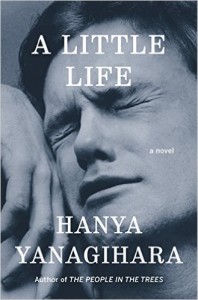 This book is quite literally breathtaking. Shortlisted for the Man Booker Prize and a National Book Award finalist, it was my personal top choice for the winner. This book will make you gasp with pleasure, with pain, with sorrow, with anger. This is one of those books that will change whomever encounters it. There will be the before you read it, and the after. It is incredibly gorgeous, but exquisitely painful. You can’t put it down, but it hurts to read it. The narrative follows a group of men, friends from an elite New England college, who stay closely connected to each other as they build lives and careers. There is an almost fairy tale quality to their stories on one level, as each one achieves significant success in his field. But even their privilege, whether inborn or hard-earned, can’t make them immune to pain and to the damage that people can inflict on each other. This is a book about love, about friendship, about trust, and about trauma that looks at the best and the worst of human behavior. Yanagihara digs deep into our capacity to wound, to nurture, to heal, to care, to cause harm. Do not read this looking for an uplifting story of redemption and recovery. Rather, this is a story in which the trauma is so bone deep that even the truest love cannot heal the damage. And yet strangely it is not a book without hope even in the midst of suffering.
This book is quite literally breathtaking. Shortlisted for the Man Booker Prize and a National Book Award finalist, it was my personal top choice for the winner. This book will make you gasp with pleasure, with pain, with sorrow, with anger. This is one of those books that will change whomever encounters it. There will be the before you read it, and the after. It is incredibly gorgeous, but exquisitely painful. You can’t put it down, but it hurts to read it. The narrative follows a group of men, friends from an elite New England college, who stay closely connected to each other as they build lives and careers. There is an almost fairy tale quality to their stories on one level, as each one achieves significant success in his field. But even their privilege, whether inborn or hard-earned, can’t make them immune to pain and to the damage that people can inflict on each other. This is a book about love, about friendship, about trust, and about trauma that looks at the best and the worst of human behavior. Yanagihara digs deep into our capacity to wound, to nurture, to heal, to care, to cause harm. Do not read this looking for an uplifting story of redemption and recovery. Rather, this is a story in which the trauma is so bone deep that even the truest love cannot heal the damage. And yet strangely it is not a book without hope even in the midst of suffering.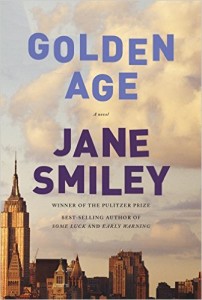 The third, and sadly, final book in Smiley’s Last Hundred Years Trilogy continues the march forward of the Langdon family as they continue to bump up against realities of the time in which they live. At the risk of being overly grandiose, there is something almost sweepingly biblical about the trilogy, with its spare writing and ability to depict dramatic change through the small details of individuals lives. This hundred year journey depicts the story of a tribe as it makes its way from its Iowa farm origins and spreads throughout the country, with each generation and indeed each family member responding each in his or her own way to the world. The family members are impacted by the events, trends, and developments that occur in their lifetimes: the economy, feminism, drugs, the sexual revolution, psychoanalysis, cults are just some of the factors by which their lives are shaped. War is an especially powerful and recurrent theme, as different generations are impacted by different wars in different ways. And yet the individuals who make up the now quite extended Langdon clan never completely sever their ties to the land and the primal power of the natural world. From the centrality of the farm and the lack of control over things like rain and drought in the first book, this third circles back in a near-apocalyptical way to the family farm and the environment. Climate change, with its attendant fears and impact on human life, looms large in this last book in the trilogy, which depicts a worrisome future not too far away from now. If you haven’t read the first two in the series (see review of the 2nd book), read them in the proper order, but do read them!
The third, and sadly, final book in Smiley’s Last Hundred Years Trilogy continues the march forward of the Langdon family as they continue to bump up against realities of the time in which they live. At the risk of being overly grandiose, there is something almost sweepingly biblical about the trilogy, with its spare writing and ability to depict dramatic change through the small details of individuals lives. This hundred year journey depicts the story of a tribe as it makes its way from its Iowa farm origins and spreads throughout the country, with each generation and indeed each family member responding each in his or her own way to the world. The family members are impacted by the events, trends, and developments that occur in their lifetimes: the economy, feminism, drugs, the sexual revolution, psychoanalysis, cults are just some of the factors by which their lives are shaped. War is an especially powerful and recurrent theme, as different generations are impacted by different wars in different ways. And yet the individuals who make up the now quite extended Langdon clan never completely sever their ties to the land and the primal power of the natural world. From the centrality of the farm and the lack of control over things like rain and drought in the first book, this third circles back in a near-apocalyptical way to the family farm and the environment. Climate change, with its attendant fears and impact on human life, looms large in this last book in the trilogy, which depicts a worrisome future not too far away from now. If you haven’t read the first two in the series (see review of the 2nd book), read them in the proper order, but do read them! Another Man Booker longlist title, this is one of those books that just quietly sneaks up on you until you’re completely enraptured. The story essentially follows two trajectories, one of an older woman Anne, and the other of Luke, her grandson. Anne, now battling old age, is someone who was almost famous – a pioneering photographer who garnered some attention in her time but has been long forgotten. Her grandson Luke is a soldier in Afganistan whose mission has gone seriously off course. When Luke was a child, Anne had taught him how to see beyond the ordinary into the extraordinary, a bond which still unites to two. Their stories reconnect once Luke returns home and comes to visit his grandmother, taking her on a journey which stirs up her past and his present, and illuminates that which has been hidden. Without veering into sentimentality, it is a tender tale of a pairing not seen often in literature, that of a grandmother and a grandson.
Another Man Booker longlist title, this is one of those books that just quietly sneaks up on you until you’re completely enraptured. The story essentially follows two trajectories, one of an older woman Anne, and the other of Luke, her grandson. Anne, now battling old age, is someone who was almost famous – a pioneering photographer who garnered some attention in her time but has been long forgotten. Her grandson Luke is a soldier in Afganistan whose mission has gone seriously off course. When Luke was a child, Anne had taught him how to see beyond the ordinary into the extraordinary, a bond which still unites to two. Their stories reconnect once Luke returns home and comes to visit his grandmother, taking her on a journey which stirs up her past and his present, and illuminates that which has been hidden. Without veering into sentimentality, it is a tender tale of a pairing not seen often in literature, that of a grandmother and a grandson.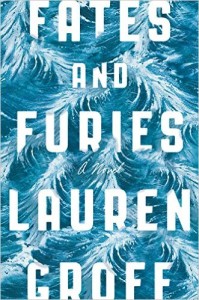 Get ready for a gyrating tale about marriage and the tales we build about ourselves and those we love. The book, a finalist for the 2015 National Book Award, is divided into the first half, Fates, and the second, Furies, as it chronicles the lives and marriage of the two central character, Lotto and Mathilde. Fates focuses on Lotto, and what better name for this character. Does he make his own fate, was it predetermined, is it all just a game of chance, or was it shaped behind the scenes by one of the powerful women in his life? Is his creativity really his, is it well deserved, or just luck? Furies shifts to Mathilde, who is revealed to be someone quite different than she seemed when she was the subject of Lotto’s narrative. This is a fascinating, at times grim, but always powerful story of passion, determination, manipulation, and our human tendency to see what we want to see in those around us.
Get ready for a gyrating tale about marriage and the tales we build about ourselves and those we love. The book, a finalist for the 2015 National Book Award, is divided into the first half, Fates, and the second, Furies, as it chronicles the lives and marriage of the two central character, Lotto and Mathilde. Fates focuses on Lotto, and what better name for this character. Does he make his own fate, was it predetermined, is it all just a game of chance, or was it shaped behind the scenes by one of the powerful women in his life? Is his creativity really his, is it well deserved, or just luck? Furies shifts to Mathilde, who is revealed to be someone quite different than she seemed when she was the subject of Lotto’s narrative. This is a fascinating, at times grim, but always powerful story of passion, determination, manipulation, and our human tendency to see what we want to see in those around us.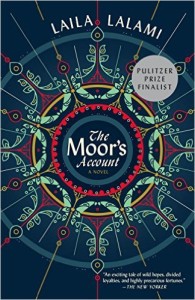 This book has a serious pedigree: it is a Pulitzer Prize Finalist, longlisted for the Man Booker Prize, and winner of the American Book Award. And the accolades are well deserved. This account by a black Moroccan slave provides an untold perspective of the colonization of the Gulf coast of the what is now the United States by Spanish conquistadors in the 16th century. The writing is gorgeous, with lush descriptions of both people and place, and the relationships between the characters are fully drawn in all their complicated richness. In the course of their perilous journey, the narrative deftly explores questions about the constructs of race, class, gender, and power, and of course colonization. This book is part adventure tale, part historical fiction, part a meditation on the notions of civilization and culture, part just a beautiful work of writing that will get its grip on you and not let go until you’ve read the last page.
This book has a serious pedigree: it is a Pulitzer Prize Finalist, longlisted for the Man Booker Prize, and winner of the American Book Award. And the accolades are well deserved. This account by a black Moroccan slave provides an untold perspective of the colonization of the Gulf coast of the what is now the United States by Spanish conquistadors in the 16th century. The writing is gorgeous, with lush descriptions of both people and place, and the relationships between the characters are fully drawn in all their complicated richness. In the course of their perilous journey, the narrative deftly explores questions about the constructs of race, class, gender, and power, and of course colonization. This book is part adventure tale, part historical fiction, part a meditation on the notions of civilization and culture, part just a beautiful work of writing that will get its grip on you and not let go until you’ve read the last page.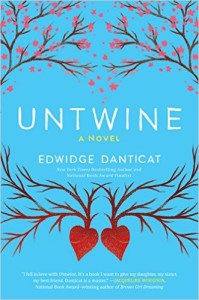 Danticat’s last book, Claire of the Sea Light, was among my favorite books of the past few years. Untwine is a YA novel, and anyone looking for the magic of Claire will be in for a disappointment in comparison. But once you understand that it indeed meant to be in the YA category and adjust your expectations accordingly, there’s a lot to love here in this heartrending story of two identical twins, and the aftermath of a terrible car accident. In the face of tragedy, this book elegantly asks the question of how do you keep on living when half of you is suddenly gone? How do you understand who you are when your whole sense of self has changed in an instant? The intergenerational family relationships are beautifully brought to life and provide the life-affirming underpinning of this tragic story.
Danticat’s last book, Claire of the Sea Light, was among my favorite books of the past few years. Untwine is a YA novel, and anyone looking for the magic of Claire will be in for a disappointment in comparison. But once you understand that it indeed meant to be in the YA category and adjust your expectations accordingly, there’s a lot to love here in this heartrending story of two identical twins, and the aftermath of a terrible car accident. In the face of tragedy, this book elegantly asks the question of how do you keep on living when half of you is suddenly gone? How do you understand who you are when your whole sense of self has changed in an instant? The intergenerational family relationships are beautifully brought to life and provide the life-affirming underpinning of this tragic story.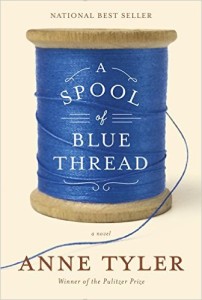 There were moments that shone in this intergenerational family story, but overall this book was only fine. Not terrible, but not great. Just fine. I am not, admittedly, a great fan of Anne Tyler’s novels, but its designation as a Man Booker shortlist title intrigued me. I read the book wanting to be surprised, but alas, that did not happen. This novel covers several generations of the Whitshank family, and centers around a house built originally by the family patriarch. Perhaps this book suffers from having been read in close proximity to Smiley’s Hundred Year Trilogy, which similarly tells the story of several generations of a family and not a house but a farm (see above). But where Smiley’s account had depth and nuance, Tyler’s feels tired and predictable.
There were moments that shone in this intergenerational family story, but overall this book was only fine. Not terrible, but not great. Just fine. I am not, admittedly, a great fan of Anne Tyler’s novels, but its designation as a Man Booker shortlist title intrigued me. I read the book wanting to be surprised, but alas, that did not happen. This novel covers several generations of the Whitshank family, and centers around a house built originally by the family patriarch. Perhaps this book suffers from having been read in close proximity to Smiley’s Hundred Year Trilogy, which similarly tells the story of several generations of a family and not a house but a farm (see above). But where Smiley’s account had depth and nuance, Tyler’s feels tired and predictable.
